Key takeaways:
- Musician interviews provide deep emotional insights, enhancing the connection between artists and fans by revealing the stories behind their music.
- Preparation is crucial for effective interviews; understanding an artist’s discography and crafting open-ended questions fosters authentic conversations.
- Memorable interview moments often arise from unexpected topics, revealing the profound impact of music on artists’ lives.
- Sharing insights from interviews can inspire and create community among fans, highlighting shared experiences and emotional expressions.
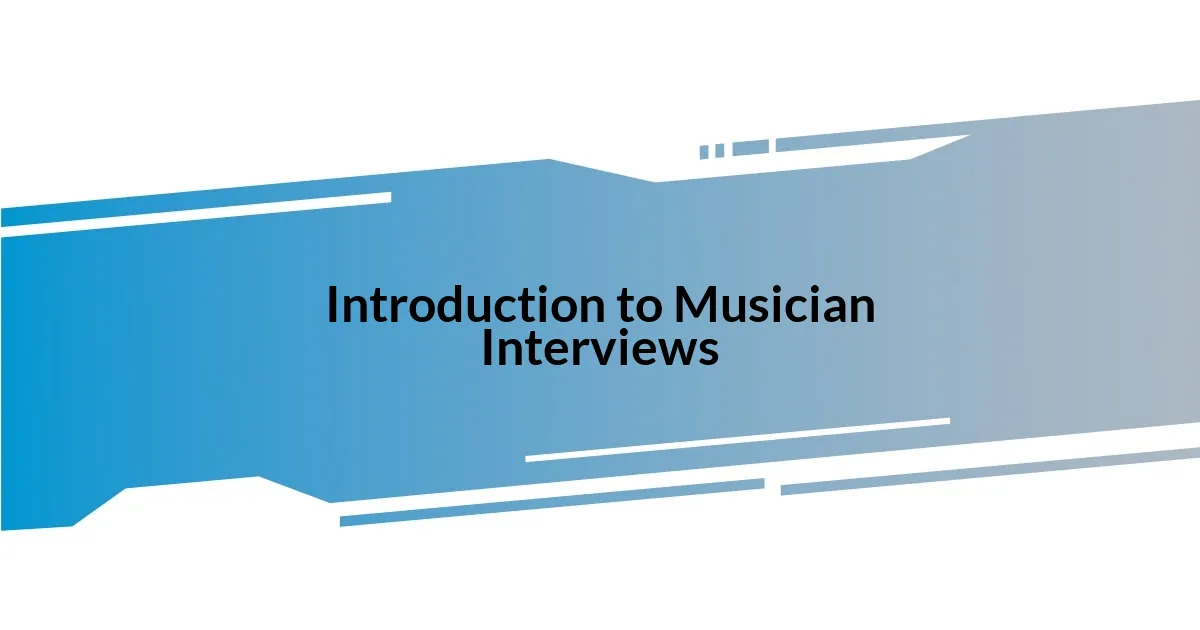
Introduction to Musician Interviews
Interviews with musicians are more than just a conversation about their craft; they’re a window into their souls. I remember sitting down with a local artist, feeling the energy shift as they shared stories behind their lyrics. It made me wonder, how often do we really get to see the heart behind the music we love?
Every interview is filled with unique insights that can completely change the way we experience songs. Have you ever listened to a track and thought, “What were they going through when they created this?” I know I have, and it’s in those interviews that I often find the answers that connect me deeper to the artist and their journey.
Reflecting on these candid moments, I realize that musician interviews reveal their struggles, triumphs, and creative sparks. It’s almost like a backstage pass into their lives, where we get to uncover not just the music, but the meaning behind it all. Isn’t it fascinating how a simple conversation can transform our understanding of an entire album?
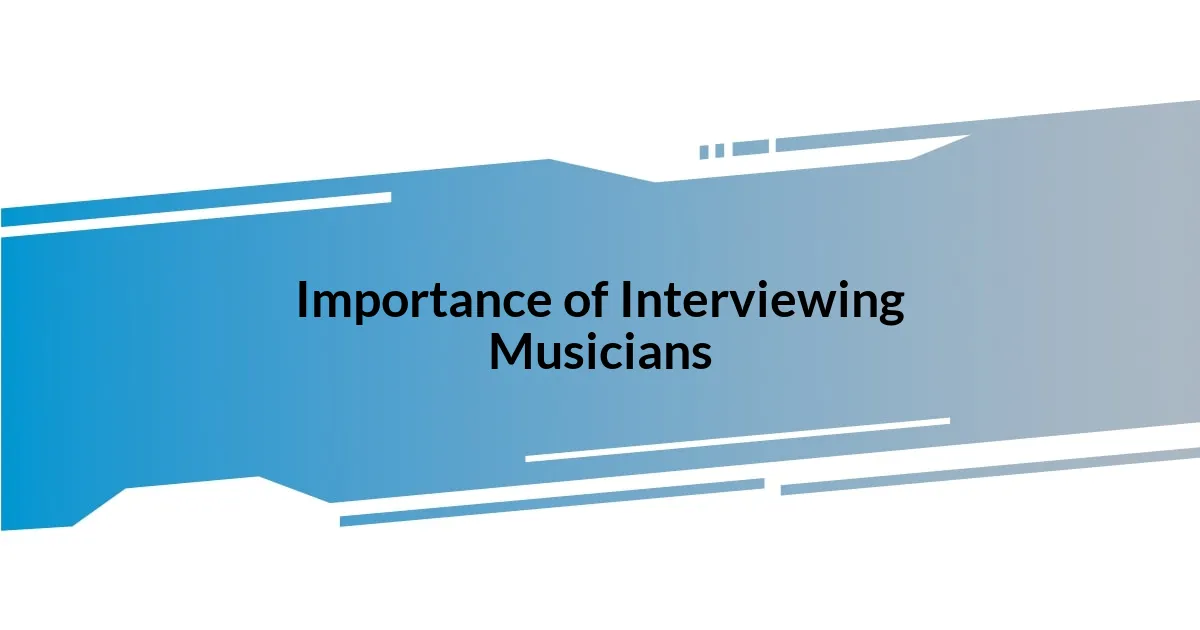
Importance of Interviewing Musicians
Interviews with musicians are essential not only for gaining insights into their artistic processes but also for deepening our emotional connections to their music. I recall a conversation I had with a musician who talked about how a personal loss influenced their latest album. Hearing their raw emotions added a layer of depth to every note I listened to, transforming the music from mere sound to a heartfelt expression of their journey.
Moreover, these interviews serve as an important record of artistic history. For example, when talking to an emerging artist, I was struck by their passion and vision for the future of music. These conversations preserve unique perspectives that might otherwise be lost, making it crucial for us to archive these voices for future generations.
Another aspect to consider is the common ground that interviews often create between musicians and their fans. During a discussion with a well-known guitarist, I was moved when they shared their struggles with anxiety, just like many of us face in daily life. It’s moments like these that remind us that musicians are not just entertainers; they’re people with real feelings and experiences, allowing us to feel connected on a human level.
| Importance Aspect | Description |
|---|---|
| Emotional Connection | Interviews reveal the emotions behind the music, enhancing our listening experience. |
| Artistic Record | Preserving unique artistic perspectives for future generations. |
| Shared Experiences | Creating a sense of shared humanity between musicians and their fans. |
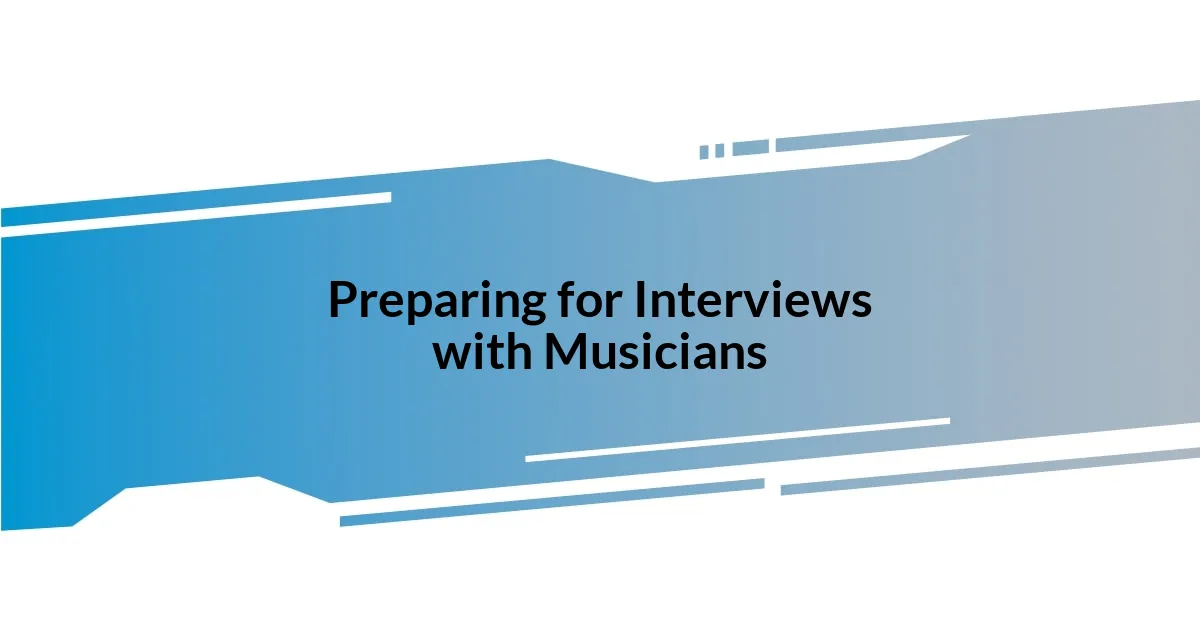
Preparing for Interviews with Musicians
When it comes to preparing for interviews with musicians, research is your best friend. Before I sit down with an artist, I immerse myself in their music, soaking up their lyrics and stories. This helps me form thoughtful questions that resonate with their experiences. I remember one time I was able to reference a lesser-known track during an interview, and the musician’s face lit up. It set the tone for a deeper discussion, turning a simple Q&A into a heartfelt conversation.
Here are some key preparation tips to keep in mind:
- Explore Their Discography: Listen to all their albums, especially the latest release, for context and inspiration.
- Read Interviews and Articles: Familiarize yourself with past interviews to avoid repetitive questions and to identify topics that excite the artist.
- Know Their Influences: Understanding the musicians and genres that inspire them can lead to insights during your conversation.
- Prepare Open-Ended Questions: Craft questions that encourage storytelling and sharing personal experiences.
- Create a Comfortable Atmosphere: I always ensure that the space feels safe and welcoming, which often brings out more genuine responses.
The goal here is to connect authentically, and preparation makes all the difference.
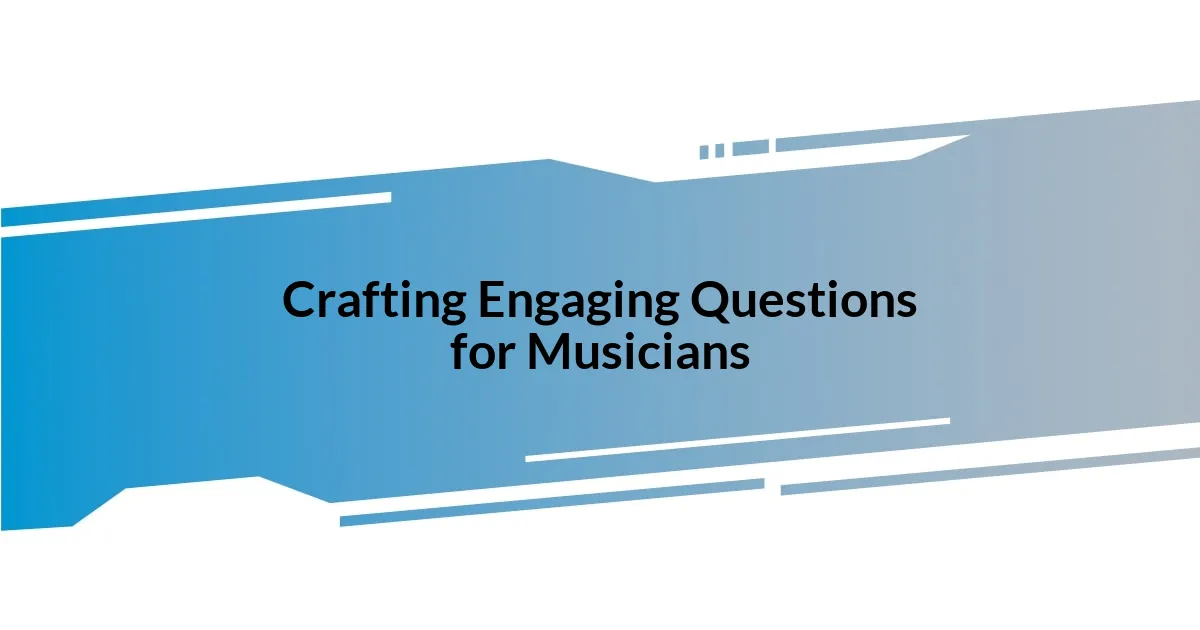
Crafting Engaging Questions for Musicians
Crafting engaging questions for musicians is about curiosity and genuine interest. I often find that when I prepare questions that reflect my excitement for their work, it makes the musician more open. For instance, I once asked an artist about the story behind a seemingly cryptic lyric, and their response unveiled layers of meaning I hadn’t imagined. It was a moment that transformed my understanding of their artistry.
A useful approach is to mix personal and broad questions, allowing the artist to reveal themselves in different ways. I remember during an interview, asking a singer about their favorite childhood memory related to music. That question sparked a delightful story that not only illustrated their beginnings but also brought a warm smile to their face. It felt like we were sharing a moment rather than just exchanging questions and answers.
I’ve learned that the tone and structure of questions can greatly impact the depth of the conversation. Open-ended questions, in particular, encourage a flow of ideas. Have you ever noticed how artists respond differently when they feel they can express their thoughts freely? This shift can lead to profound insights that resonate deeply with anyone who appreciates their work, turning the interview into an exploration of passions rather than just a checklist of queries.
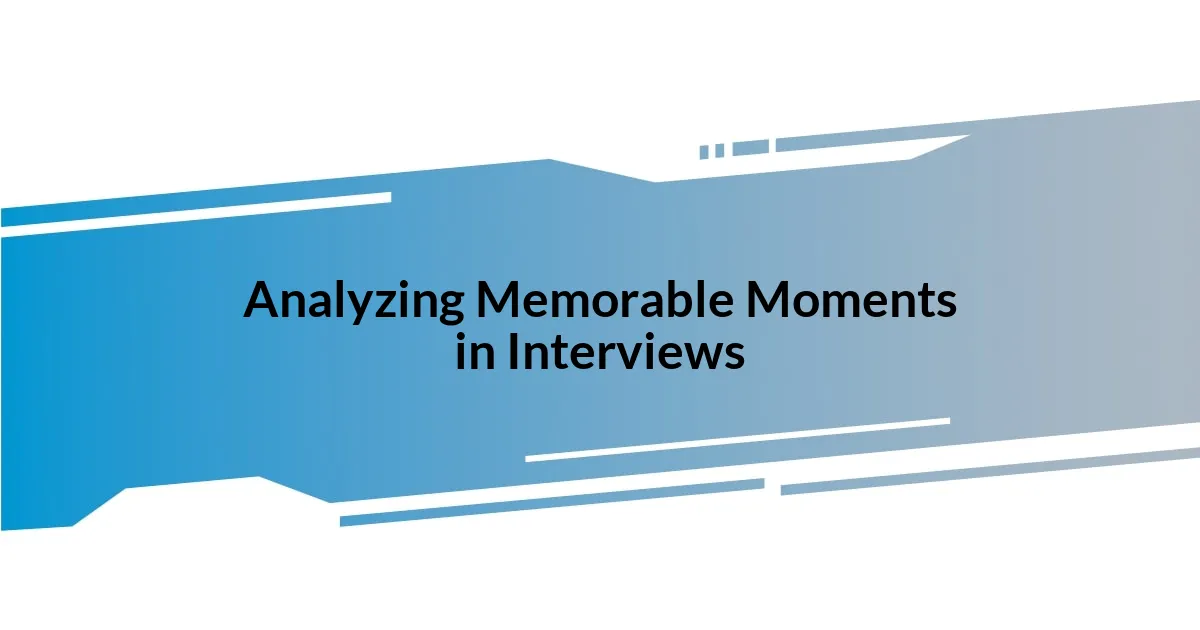
Analyzing Memorable Moments in Interviews
There are moments in interviews that hit you right in the feels. I’ll never forget an interview with a jazz musician who shared how a single song saved him during a tough time. Hearing him describe that process was more than just an answer; it was a glimpse into how deeply music can affect us. It’s these raw revelations that often linger in your mind because they paint a vivid picture of the artist’s reality.
Another unforgettable moment was when I asked a folk singer about their creative process while they were on tour. Instead of the expected response, they shared a beautiful story about writing a song under the stars after a particularly difficult show. The imagery they created was so powerful that I honestly felt like I was sitting beside them, enveloped by the night sky. Isn’t it incredible how one question can unlock such intimate experiences and memories?
Sometimes the most memorable exchanges come from unexpected topics. I once asked a rock guitarist what he thought about the evolution of music genres and his passionate response sparked an entirely new conversation about identity and art. Observing the fire in his eyes as he spoke reminded me that music isn’t just a job for these artists; it’s a lifeline, a part of their very being. Have you ever considered how a simple spark of curiosity can lead to such depth in an interview? That connection is invaluable.
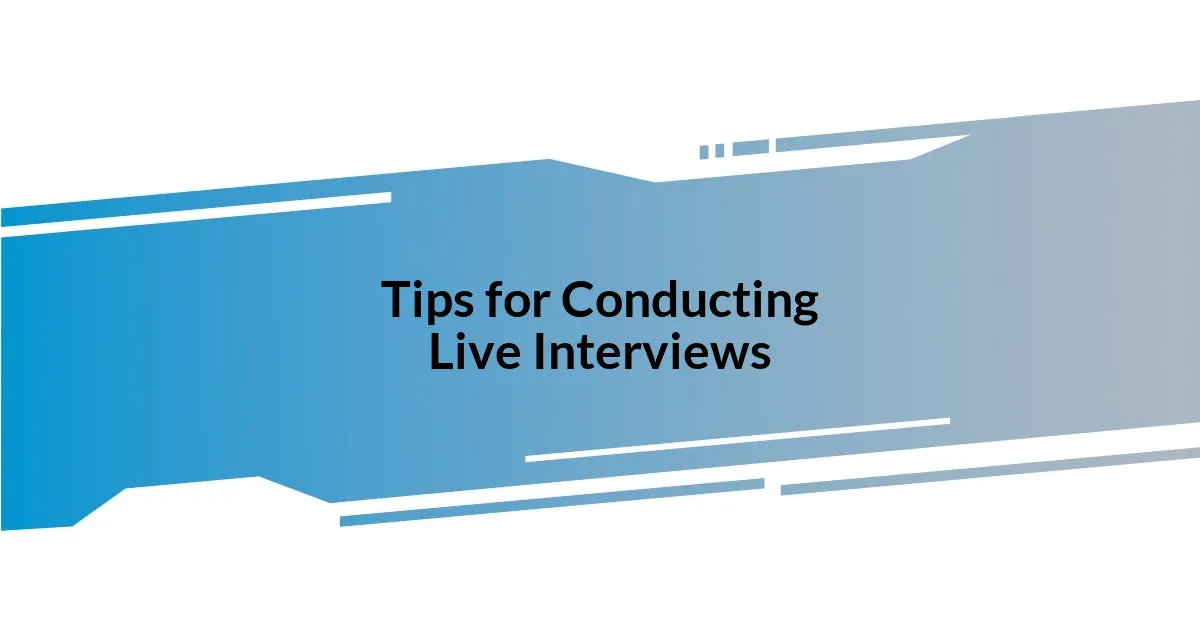
Tips for Conducting Live Interviews
When conducting live interviews, it’s crucial to create an inviting atmosphere. I remember my first live interview; I was incredibly nervous, but as soon as I cracked a joke, the tension dissolved, and the artist visibly relaxed. Have you ever noticed how laughter can break down barriers? That light-hearted moment led to a much richer dialogue.
Being present during the conversation is essential. I often focus on the artist’s body language and tone, as these cues can provide valuable insights beyond their words. For instance, during a live session with a pop star, I noticed their excitement when discussing a specific project. Dialing into those moments allows you to dive deeper, asking follow-up questions that can uncover unexpected gems in their story.
Lastly, it helps to be flexible with your interview plan. I once began an interview intending to discuss an artist’s latest album, but they brought up their advocacy for mental health. I pivoted and had a heartfelt discussion about its importance in the music industry. This shift not only enriched our conversation but also resonated with many listeners who appreciated the genuine direction it took. How often can a spontaneous turn lead to authenticity in dialogue?
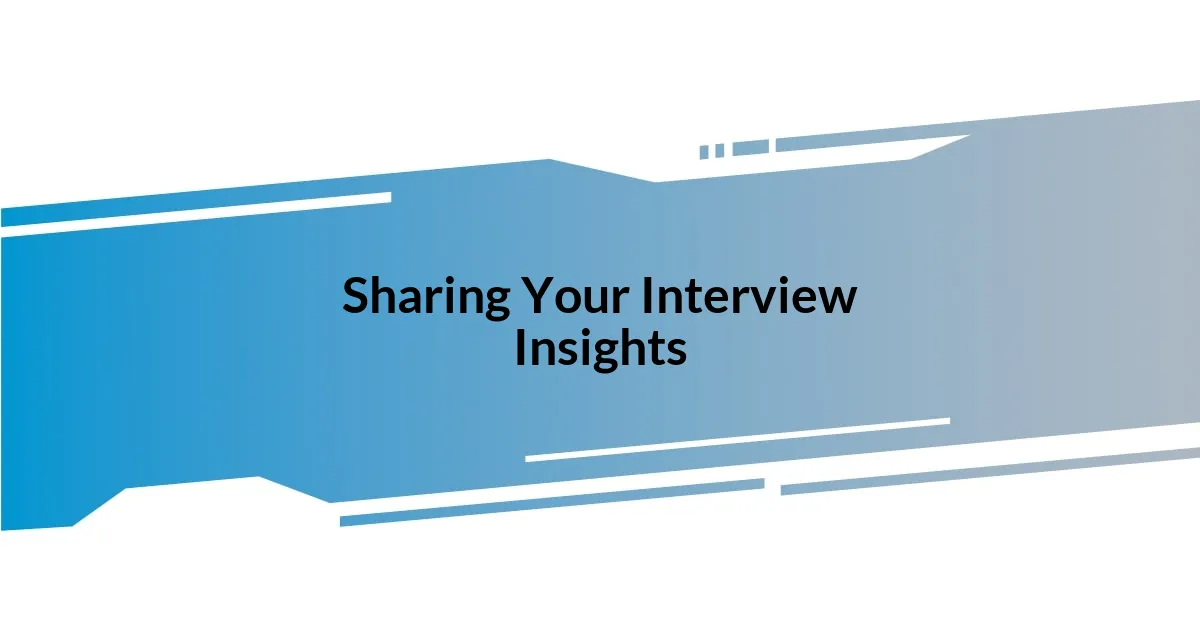
Sharing Your Interview Insights
Sharing insights from interviews can be a treasure trove for both fans and aspiring musicians. I recall a time when I revealed a behind-the-scenes moment from an interview with a hip-hop artist. He shared how setbacks in his life fueled his creativity, something that resonated deeply with listeners who might be facing their own challenges. Don’t you think that these stories of resilience can inspire others to keep pushing forward in their passions?
Another aspect to consider is how sharing your observations can create community. During a panel discussion about our favorite interviews, I mentioned a stunning moment when a country artist discussed the importance of storytelling in their songs. It sparked a lively conversation where everyone contributed their favorite narratives, making it clear that music connects us all in such profound ways. Isn’t it amazing how these moments can foster genuine connections among fans and artists alike?
I’ve also found that highlighting the emotional undertones of an interview adds layers to the conversation. When I recounted an interview with an indie musician who talked about the loneliness of touring, I noticed listeners began to share similar feelings about their own lives. It was a reminder of how vulnerability can bridge the gap between artist and audience. Can you see how sharing these insights not only enriches the discussion but helps us connect on a deeper level?